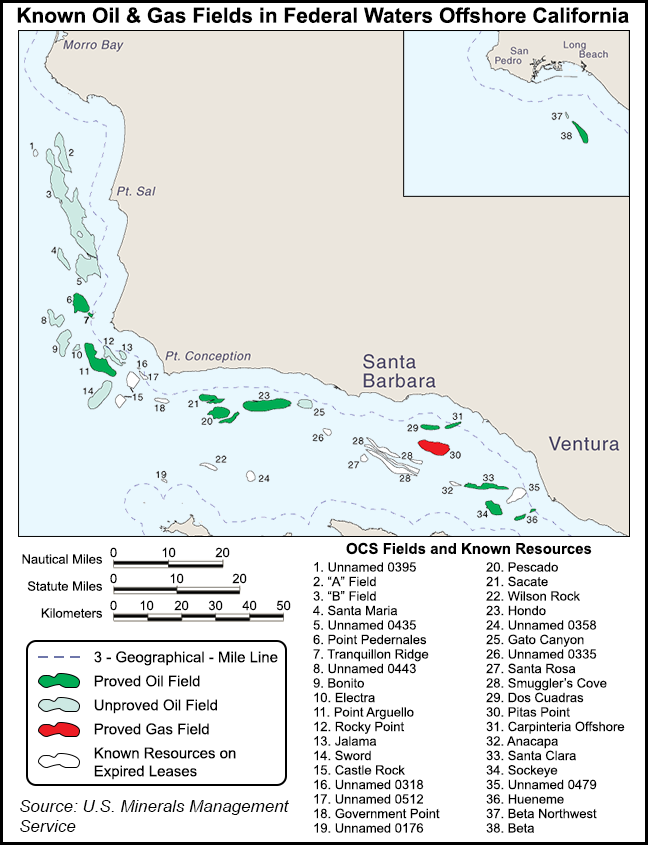Regulatory | NGI All News Access | NGI The Weekly Gas Market Report
ExxonMobil Asks to Intervene in Challenge to Oil, Gas Development Offshore California
ExxonMobil Corp., which holds most of the permits to drill offshore California, has asked to intervene in a lawsuit questioning the federal government’s authority to approve drilling in the region.

A lawsuit filed last December by the Environmental Defense Center (EDC) claims that the Department of Interior’s Bureau of Safety and Environmental Enforcement (BSEE) had not considered all of the impacts associated with offshore oil and natural gas development before permitting was approved for the Santa Barbara Channel.
The U.S. District Court for the Central District of California is considering the lawsuit, Environmental Defense Center v. Bureau of Safety and Environmental Enforcement et al, No. CV-14-9281 PSG (SH).
EDC has challenged BSEE’s approval for applications for permits to drill, or APDs, and applications for permits to modify, APMs, associated with activities from offshore platforms in the Pacific Outer Continental Shelf region. Specifically, it claims BSEE’s approval of the APDs and APMs violated the National Environmental Policy Act (NEPA) for “each and every one of the 51 approvals at issue.”
Under NEPA’s categorical exclusions, permitting is allowed without broader reviews that may require environmental impact statements or assessments. However, EDC’s lawsuit claims there also were violations by BSEE of the Outer Continental Shelf Lands Act, which requires a periodic review of drilling plans following changes to volumes, methods or impacts.
Until BSEE complies with NEPA, all pending and future APDs and APMs should be enjoined, EDC said.
A separate lawsuit also challenging permit approvals that allow hydraulic fracturing (fracking) to drill wells in California’s offshore was filed earlier this year by the Center for Biological Diversity (see Shale Daily, Feb. 23).
Interior has filed a motion stating it had considered environmental impacts and public comments throughout the permit approval process.
The American Petroleum Institute (API) asked to intervene in the EDC lawsuit in early February, and ExxonMobil followed with a similar request two weeks later.
The court could allow both API and ExxonMobil to intervene. However, EDC asked the court to only allow one to intervene, claiming API and ExxonMobil share the same objective.
Each of the proposed intervenors “has an interest in offshore well stimulation, including hydraulic fracturing and acidizing,” EDC lawyers said in a brief. “In fact, those interests are directly aligned with one another, as ExxonMobil is itself a member of API, and both claim interests in the current and potential future permits that authorize these practices, as well as the ongoing use of well stimulation in federal waters.”
That’s not true, ExxonMobil’s legal team argued. Because it holds 29 of the 51 contested permits, ExxonMobil has “unique” interests that API cannot represent adequately.
“ExxonMobil holds actual permits at issue and seeks to protect its substantial investments in the activities plaintiff is suing to enjoin,” it said in a filing. “To the contrary, API’s objective is to protect the diverse interests of its 600-plus members.”
© 2024 Natural Gas Intelligence. All rights reserved.
ISSN © 1532-1231 | ISSN © 2577-9877 | ISSN © 1532-1266 |
